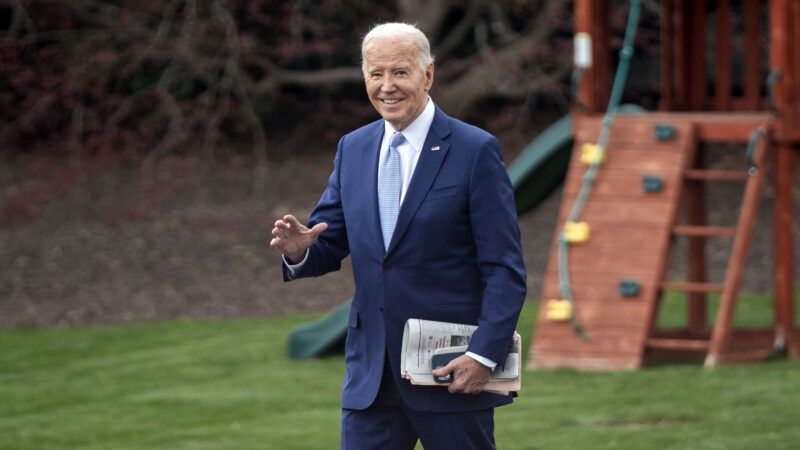What the Biden Administration Could Learn From California's Attempt To Ban Independent Contracting
Instead, the White House is pushing for similar job-killing regulations on the national level.

Perhaps I'm old fashioned, but I don't see a role for government in determining working arrangements beyond some basic rules governing safety and non-discrimination. In a free society with a generally healthy economy, employers and employees can hammer out their own deals. As long as force or coercion isn't involved, it's not the legislature's or federal bureaucracy's concern whether someone, say, takes contract jobs or full-time employment.
I cannot recall a single time that any government rule has improved my life in any noticeable way. It's usually the opposite. After the Legislature passed Assembly Bill 5—the "landmark" labor law that largely banned companies from using independent contractors—many Californians lost their freelance income, with many adopting costly workarounds that involved myriad legal and accounting costs. Thanks very much for the "protections."
AB 5 was an unmitigated disaster. That should be obvious to any policymaker in California and at the national level. An old friend of mine had a saying that went, "even the worm learns." It referred to a scientific experiment that found if you prod the dumbest of creatures (worms) several thousand times they will eventually learn not to squirm in a particular direction. The Biden administration is filled with Californians (Kamala Harris, Xavier Becerra, Julie Su), yet they somehow missed the requisite lesson. They apparently need a lot more prodding.
To recall, the California Supreme Court in the 2018 Dynamex decision imposed a strict ABC test on companies that used contractors. The case involved a delivery service that shifted its workforce from permanent employees to contractors. The court decided that contractors must be A) outside the control of the company; B) do work outside the company's core mission; and C) be working as contractors in general. Unions were giddy. The Legislature codified the decision in AB 5.
California's progressive Democrats, who apparently spend little time talking to normal people, were shocked at the results. Instead of hiring contractors as full-time workers with 9-5 schedules and oodles of benefits, companies downsized their workforces. Unions claimed they were battling "wage theft"—but there is no theft when willing workers take jobs from willing employers at agreed-upon terms.
In the midst of stay-at-home, lawmakers got an earful from struggling Californians who no longer were free to pursue home-based incomes. Volunteer musical and arts gigs had to shutter as a result of these work prohibitions. Lawmakers promised advancements for workers, but instead made their lives miserable. The funniest result: A publication that advocated for the law laid off its California workers.
The Legislature ultimately exempted 100-plus industries from the law. Voters then approved an initiative (still tied up in the courts) that exempted ride-sharing drivers. Granted, lawmakers have legislative cars at their disposal, but those of us who take Uber and Lyft—and routinely talk with our drivers—realize most of them do not want to work full-time for those companies. They like flexible schedules and fill-in work as they pursue college or other careers.
Apparently, the Biden administration doesn't pay attention to California news events. Through it all, the president has doggedly pursued implementing some variety of AB 5 through legislation and the federal Department of Labor. It recently implemented a new rule that echoes ABC test standards. The new rule doesn't have the authority of something passed by Congress or legislatures, but it makes it tougher to classify workers as contractors and could disrupt many industries. It's clearly an attempt to promote AB 5's rules.
In a strikingly biased article, the Los Angeles Times' Noah Bierman chides some conservative publications for claiming that the president is taking California's approach nationwide, when it merely restores the old Obama administration approach to these matters. Yet Bierman admits that Biden's "promise to replicate California's law at the national level has fallen victim to congressional gridlock and industry clout."
In other words, the president promised to replicate AB 5 nationally but has failed. I can only surmise that the Los Angeles Times doesn't pay much attention to California news, either. As noted above, AB 5 isn't the victim of Congress or industry—but of massive, angry blowback from California freelancers, many of them Democrats—in multiple professions who didn't appreciate losing their jobs. The story focused on San Francisco's settlement with a company that connects workers with hospitality industry jobs, so AB 5 is still wreaking havoc.
The most aggravating part of the Times article cites a study from the pro-union Economic Policy Institute, which finds "blue-collar workers classified as contractors are losing out on as much as $16,700 a year compared with what they would have made as regular employees." Perhaps it should show how much money these workers are losing when companies axe their jobs because of the AB 5-style mandates. When it comes to economics, union think tanks, reporters, and the Biden administration are as clever as those proverbial worms.
This column was first published in The Orange County Register.


Show Comments (20)